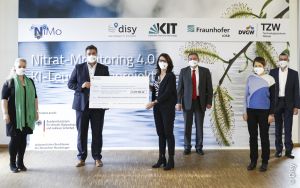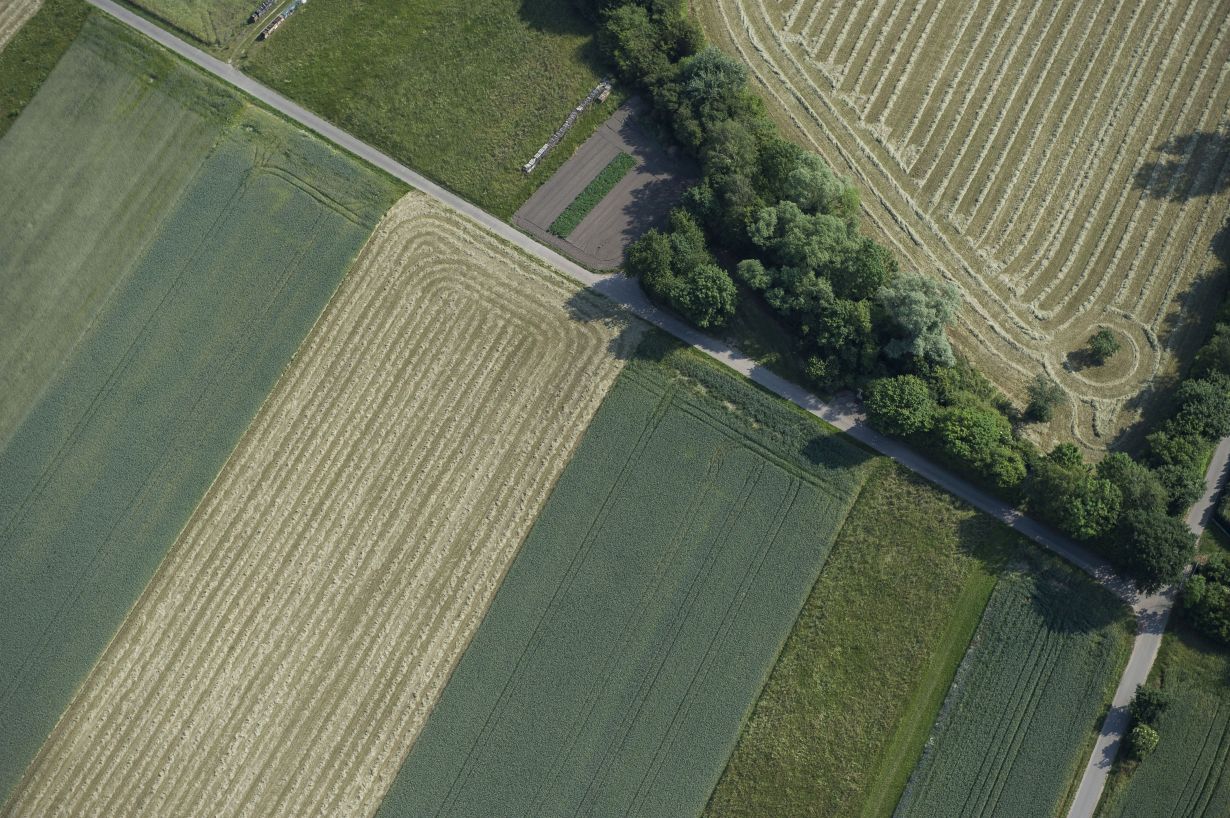With a model for forecasts, an association of researchers from Karlsruhe, including scientists from Karlsruhe Institute of Technology (KIT), seeks to efficiently and sustainably reduce nitrate concentration in groundwater. The model is based on artificial intelligence (AI). Smart decision support and self-learning computers will help the partners take adequate measures. Within the framework of the AI Strategy Program, the Federal Environmental Ministry (BMU) funds projects that manage ecological challenges with the help of artificial intelligence (AI Lighthouses). Undersecretary of State Rita Schwarzelühr-Sutter has now handed over the funding approval.
High nitrate concentrations in groundwater and their impacts on humans and the environment recently met with increasing public awareness. If the crops grown on the fields are not fertilized as needed, more nitrogen enters the ground than can be taken up by the plants. This nitrogen is dissolved in water and enters the groundwater in the form of nitrate. About 70% of the German drinking water is extracted from groundwater. Too high nitrate concentrations in the drinking water may damage human health, such that supply companies have to take complex measures to reduce nitrate concentrations. Water monitoring shows that groundwater quality is endangered at many places.

Handover of the funding approval for the NiMo 4.0 project. From left to right: Dr. Tanja Liesch (AGW, KIT), Claus Hofmann (Managing Director of Disy), Rita Schwarzelühr-Sutter (Undersecretary of State), Dr. Thomas Usländer (Fraunhofer IOSB), Bettina Lisbach (City of Karlsruhe, Mayor for the Environment and Health), Dr. Josef Klinger (Managing Director of TZW). (Photo: Disy)
Within the project “Nitrate Monitoring 4.0 – Smart Systems for Sustainable Nitrate Reduction in Groundwater“ (NiMo 4.0), scientists from KIT and other partners develop a smart system to better understand and predict spatial and temporal distribution of nitrate in groundwater with a few measurement points only. With the help of such forecasts based on machine-learning methods, smart decision support will be achieved to find optimal places for additional measurements and launch optimal programs for groundwater protection. NiMo 4.0 is funded with a total of EUR 2.478 million within the framework of the initiative “AI Lighthouses for the Environment, Climate, Nature, and Resources” of the Federal Ministry for the Environment, Nature Conservation, and Nuclear Safety (BMU).
“BMU has agreed to fund this project, because the nitrate problem in German groundwater represents an ecological challenge,” said Undersecretary of State Rita Schwarzelühr-Sutter (BMU) when she handed over the approval letter to the cooperation partners. “Use of smart software may help combine ecological and economic interests of the society, water supply companies, and agriculture. This will give rise to smart environmental technologies for wide later application.”
Interdisciplinary Consortium Develops Nitrate Monitoring 4.0
Within the BMU-funded project, this consortium of partners from fundamental and applied research, technology transfer, and industry, will pool its competencies: Disy Informationssysteme GmbH (project coordination), a spinoff of the FZI Research Center for Information Technology and Karlsruhe University, today’s Karlsruhe Institute of Technology (KIT); the Hydrogeology Department of KIT’s Institute of Applied Geosciences (AGW); the Fraunhofer Institute of Optronics, System Technologies and Image Exploitation IOSB with its offices in Karlsruhe and Ilmenau; and the DVGW-Technologiezentrum Wasser (TZW, German Water Centre) with its offices in Karlsruhe and Dresden. The solutions developed will be implemented and demonstrated on a prototype scale in two pilot regions, in the catchment area of the Baden-Württemberg State Water Supply Association and in the catchment of the Niedergrafschaft Association for Water Supply and Wastewater Management in Lower Saxony.
KIT’s AGW assumes a leading role in German research into artificial intelligence for hydrogeological problems and possesses vast experience in the analysis and assessment of pollutants in groundwater. AGW will contribute its expertise in AI-based modeling of nitrate distribution in groundwater with neural networks. Moreover, it will be responsible for the scientific coordination of the project.
Fraunhofer IOSB will support AI-based data evaluation in the project by a procedure for the systematic use of machine-learning methods and a forecast model for nitrate concentrations in groundwater to discover anomalies in the values measured at an early stage. In addition, IOSB will focus on the design of a smart sensor data infrastructure. It is planned to use and further develop the lightweight SensorThings API standard of the Open Geospatial Consortium (OGC) to facilitate connection of new sensors and the integration of existing databases.
TZW’s expert opinions, studies, and inspection services for the entire water sector combine research and practice. Activities focus on scientific advising of water supply companies. Here, resources management and problems associated with groundwater protection and agriculture play a central role. TZW possesses vast practical experience in the areas of groundwater monitoring and analysis of large data volumes on nitrate concentrations in German raw water resources. Via an online portal established by TZW in cooperation with Disy, water suppliers can provide data on groundwater and raw water quality for regional and supraregional evaluations. Within the NiMo 4.0 project, TZW will optimize groundwater measurement networks and tools for water quality monitoring in daily operation.
Disy Informationssysteme GmbH, the coordinator of the project, will combine the different scientific and technical solutions in prototype software solutions for smart data analysis and user-friendly decision support systems. Development work will focus on efficient data visualization and effective interfaces for end users and modern data infrastructures that can be embedded in the existing software of the users. “We are looking forward to coordinating this challenging project on a subject of high ecological relevance,” says Managing Director of Disy, Claus Hofmann, who is proud of having acquired funding in this highly competitive competition. “NiMo 4.0 will help Disy use and further develop latest methods of data science and artificial intelligence for environmental protection.”
More information: https://nimo-projekt.de/ (in German)
Weitere Pressekontakte:
Disy: Dr. Wassilios Kazakos, Head of Marketing, Business Development, Phone: +49 721 1 6006-000, Email:presse ∂does-not-exist.disy net
Fraunhofer IOSB: Ulrich Pontes, Press and Communications, Phone: +49 721 6091-301, Email:ulrich pontes ∂does-not-exist.iosb fraunhofer de
TZW: Dagmar Uhl, Public Relations, Phone: +49 721 9678-233, Email:dagmar uhl ∂does-not-exist.tzw de
Being “The Research University in the Helmholtz Association”, KIT creates and imparts knowledge for the society and the environment. It is the objective to make significant contributions to the global challenges in the fields of energy, mobility, and information. For this, about 10,000 employees cooperate in a broad range of disciplines in natural sciences, engineering sciences, economics, and the humanities and social sciences. KIT prepares its 22,800 students for responsible tasks in society, industry, and science by offering research-based study programs. Innovation efforts at KIT build a bridge between important scientific findings and their application for the benefit of society, economic prosperity, and the preservation of our natural basis of life. KIT is one of the German universities of excellence.

